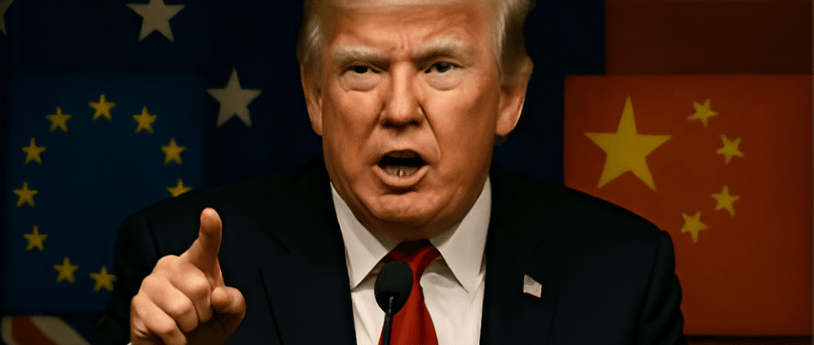The Tariff Tsunami: How Trump's 'Liberation Day' Could Reshape Global Trade
Blog postApril 2, 2025, will forever be etched in history as "Liberation Day," a moment when President Donald Trump unleashed a tidal wave of tariffs on nearly every nation trading with the United States. This bold move, aimed at rebalancing the global trade landscape, has sent shockwaves across the world, leaving economists, politicians, and ordinary citizens questioning the future of international commerce. description.
4/3/20254 min read


The Tariffs: A New Era of Protectionism (or How I Learned to Stop Worrying and Love Trade Wars)
So, I was sipping my morning coffee last week when I nearly choked on my toast reading about Trump's new tariff plan. This isn't just some minor policy tweak, folks - we're talking about a full-blown declaration of economic independence that might just reshape global trade as we know it.
Let me break this down in plain English: The U.S. is slapping a baseline 10% tariff on literally EVERYTHING we import. But that's just the starting point. Depending on how much a country sells to us versus buys from us, that tariff could balloon anywhere from 10% to a jaw-dropping 50%.
I made this quick reference chart to keep track of who's getting hit hardest:
Country | Tariff Rate Vietnam | 46% (ouch!) China | 34% (no surprise there) India | 26% (that's gonna hurt) EU | 20% (sorry, Europe) UK | 10% (special relationship?) Australia | 10% (got off relatively easy)
When I showed these numbers to my buddy who works in international shipping, he just shook his head and muttered something about needing a stronger drink.
"Liberation Day" (Really?)
That's what Trump's calling it. Not kidding.
His reasoning? It's pretty straightforward - he believes American workers and industries need protection from what he sees as unfair trade practices. When I was talking to my uncle (who's worked in manufacturing for 30+ years), he was actually cheering this move. "Those countries restrict our exports all the time," he told me, "it's about time we fight back."
But here's where it gets complicated. My cousin, who teaches economics at the local community college, had a completely different take. "This could spiral into a trade war faster than you can say 'supply chain disruption,'" she warned me over Sunday dinner. The argument at our table got pretty heated - we had to switch to talking about the weather!
How's the World Taking It?
Not well, from what I can tell. I've been following reactions from around the globe, and it's a mix of shock, anger, and nervous calculations.
The European Union is basically saying "if you hit us with 20%, we'll hit back." I've got friends who export American goods to Europe, and they're freaking out about what might happen to their businesses if the EU retaliates.
China's response has been more measured - typical for them - but you just know they're scrambling behind the scenes to figure out how to handle a 34% tariff. They've been through the tariff battles before, and they don't back down easily.
But it's Vietnam that really breaks my heart. A 46% tariff is brutal for a country that's worked so hard to build its manufacturing base. I visited Ho Chi Minh City last year and saw firsthand how much the export economy means to everyday Vietnamese citizens. This could devastate them.
What This Means for Your Wallet
Let's get real about what these tariffs could mean for us regular folks:
Inflation is the big worry. When I mentioned the tariffs to my wife, her first question was "Are we going to pay more for groceries?" Smart woman. The answer is probably yes - especially for anything with imported components.
I've already noticed prices creeping up at local stores, and these tariffs haven't even kicked in yet. My neighbor, who runs a small electronics repair shop, tells me he's already getting notices from his suppliers about coming price increases.
The scariest part? If other countries retaliate (and why wouldn't they?), we could see a snowball effect that impacts everything from job security to retirement savings. My retirement account took a dive just on the announcement of these tariffs.
The Experts Are Battling It Out
I've been reading everything I can get my hands on about these tariffs, and the expert opinions are all over the map.
Some economists are arguing that this short-term pain will lead to long-term gain - that manufacturing will come roaring back to American shores and create a new wave of good-paying jobs. Others are predicting doom and gloom, with warnings about a potential global recession.
My brother-in-law (who works for a major retailer) told me their company is already scrambling to find domestic suppliers for products they've been importing for decades. "It's not that easy to just switch," he explained over beers last Friday. "Some of this stuff just isn't made here anymore."
What Happens Next?
Honestly, I don't think anyone knows for sure. We're in uncharted waters here.
What I do know is that the economic landscape has shifted dramatically. Companies are reassessing their supply chains, countries are planning retaliatory measures, and consumers (that's us!) are caught in the middle.
Will these tariffs achieve their goal of bringing manufacturing back to America? Maybe. My dad, who lost his factory job back in the '90s when production moved overseas, is hopeful. "Better late than never," he told me when I called him about the news.
But I'm more concerned about the immediate impact. The last thing we need right now is higher prices and economic uncertainty. My small business is already dealing with enough challenges without adding "global trade war" to the mix.
I guess we'll have to wait and see if Trump's "Liberation Day" lives up to its name or goes down as one of history's great economic miscalculations. Either way, I'm stocking up on imported olive oil and French wine before the prices go up!
What do you think about these tariffs? Are you worried about price increases or hopeful about American manufacturing? Drop your thoughts in the comments - I'd love to hear your perspective on this economic rollercoaster we're all riding together.
Update: Since writing this post, I've heard from several readers who work in import-dependent industries. Their stories are concerning, to say the least. I'll be sharing more about the on-the-ground impact in next week's follow-up post.
